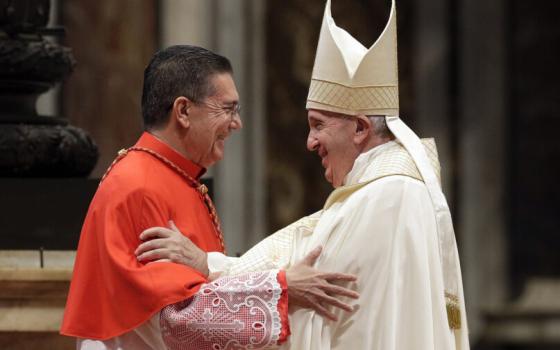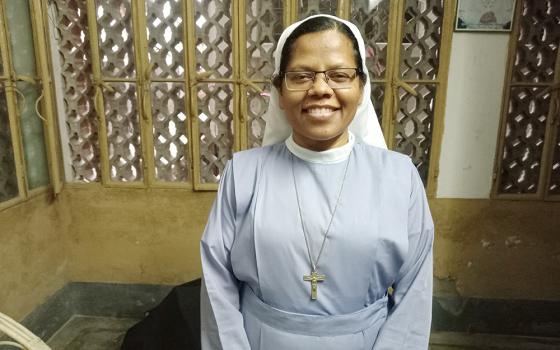On the most recent episode of ETWN's "The World Over," George Weigel voiced his displeasure with the Mass at the border celebrated last week by Cardinal Sean O'Malley, Bishop Gerald Kicanas, and the members of the Migration Committee of the USCCB. Weigel also gave his take on the meeting between Pope Francis and President Barack Obama, which, as I pointed out Friday, was tendentious at best.
"It's not clear to me how holding Mass in these circumstances can be anything other than politicized," Weigel said. A bit later, he added, "To turn the Mass into an act of essentially political theater is something I thought we had gotten over in the Church, no matter how noble the cause might be."
And, as a further indictment of the bishops' statements on immigration reform, Weigel concluded, "It's not clear to me that the principles behind a Catholic approach to immigration reform have been well articulated at all."
Here is the full video:
At the outset, let us note that EWTN's host, Raymond Arroyo, suggested the Mass was politicized in his question. Still, Weigel is not stupid. There are half a dozen ways he could have answered the question without criticizing Cardinal O'Malley and his brother bishops. I will note too that Weigel was received by the Holy Father last month. Did he voice his concern to Pope Francis that the pontiff had politicized the Mass at Lampedusa? Or did he explain how his campaign for the "evangelical reform" of the Church includes making English the working language of the Vatican Curia? Or perhaps Weigel explained how, as Professor John Cavadini pointed out, his program of evangelical reform would make perfect sense if Weigel was a Calvinist trying to reform a church in the Calvinist tradition, but his inattention to the sacramental reality at the heart of our understanding of grace was an odd omission for a Catholic advocating reform within the Catholic Church. But, I digress.
The charge that the Mass at the border "politicized" the Mass, that it was "essentially political theater," is remarkable. It overlooks the fact that the Mass was said for the repose of the souls of those who have died crossing the border. Reading Cardinal O'Malley's sermon, it is quite evident that the primary focus of the Mass was not, in fact, to push Congress to pass comprehensive and humane immigration reform. Instead, this Mass was a statement of solidarity by the bishops with our Latino brothers and sisters in their suffering, a reminder that the love of Christ does not recognize borders, a reminder that was brought vividly to life as Cardinal O'Malley and Bishop Kicanas served Communion through the slats in the border fence to the Mexican Catholics on the other side.
If Weigel watched the video of the Mass and the press conference afterward, he would certainly have realized that almost all the discussion of the need for a more humane immigration reform came at the press conference, not in the Mass. He would also have realized that Cardinal O'Malley began his remarks at the press conference by noting that the issue is complicated and that it is not the bishops' job to devise particular policies to address complicated issues. Instead, their job is to insist that our nation's policies respect the human dignity of migrants, that there is a moral and human aspect to the political issue that cannot be ignored. That seems to me a fairly clear statement of the Catholic approach to the issue. Why it is unclear to Weigel is anyone's guess.
Weigel's criticism is all the more remarkable when you consider these words he wrote at the time of the Fortnight for Freedom, the two weeks of prayer the U.S. bishops have used to call attention to the issue of religious freedom the past couple of years, a fortnight that began and ended with a Mass. He wrote:
The sensitivity to local anniversaries in the Catholic liturgical calendar often makes for happy, if coincidental, intersections with the civil calendar. Thus the "Fortnight for Freedom," a period of intensified prayer and work for religious liberty mandated by the U.S. Catholic bishops, began two weeks ago on the eve of the liturgical feats of Saints Thomas More and John Fisher -- two Tudor-period martyrs who died defending the freedom of the Church -- and ended on the Fourth of July.
Can Weigel explain why the "politicization of the Mass" that occurred during the Fortnight for Freedom was permissible but the "politicization" of the Mass at the border was not? Or why "holding a Mass in such circumstances" as the vigil before the March for Life on the anniversary of the Roe v. Wade decision is not "politicizing" the Mass? Is even a bit of consistency too much to ask from Mssr. Weigel?
The lack of consistency is not the primary problem here. Surely, Weigel understands that our Catholic worship and our Catholic beliefs, while not strictly political, have important political repercussions. Indeed, at least in his early days, one could say Weigel's career was focused precisely on wrestling with this nexus between faith and political culture. I never thought his wrestling produced much of value -- he always seemed to reduce our Catholic faith to a prop for Americanism, as if Jesus died to make America great -- but at least he tried.
Now, Weigel wrestles no more. He has acquired all the answers, retired his wrestling singlet and donned pom-poms. He stands on the sidelines, cheering on his team. And to be clear, his team is the Republican Party, not the Catholic Church. The real offense the bishops committed in Arizona for Weigel was calling attention to an issue on which the Republicans are in the wrong. And it must be especially galling to him that, unlike the Fortnight for Freedom, the Mass at the border not only received widespread media coverage, but favorable media coverage.
And the Republicans are not just wrong, but wrong in a way that must make Weigel and his crowd crazy. In an interview with John Allen, Cardinal O'Malley pointed out that the cause of immigration reform is a "pro-life issue." Now, O'Malley did not say abortion and immigration reform are the same, because they obviously are not. But O'Malley and his brother bishops and anyone who watched the Mass at the border recognize what Weigel and certain other conservative Catholics have been trying to obfuscate for decades: Our Catholic concern for the unborn is rooted in the exact same source as our concern for the poor, for those on death row and for migrants. In each and every case, it is our belief that as Catholics, we are called to promote the human dignity of all that propels us to advocate certain political approaches and to shun others. Both parties are guilty of conveniently denying the human dignity of certain people when it suits them. It is simple honesty to admit as much. But such simple honesty seems in little evidence at EWTN.
It is worth remembering that Weigel has spent much of his public career castigating liberal Catholics for putting their politics before their religion, for adopting a secular lens when a religious lens is called for. He has fretted about so-called "cafeteria Catholics" who pick and choose among the doctrines of the Church. Now, he stands guilty of the same crime he has so frequently accused others of, cafeteria Catholicism through and through. Weigel does not like the offerings on immigration, so he moves on to something more to his taste.
At least Weigel did not invoke the claim made by news anchor Brian Patrick on "EWTN's News Nightly" the night before. I was pleased Patrick had someone from the USCCB's migration committee on to discuss the issue as well as a Democratic congressman. But toward the end of the segment, Patrick said something to the effect that immigration reform was an issue of "prudential judgment" and therefore an issue on which Catholics can disagree. How often must we slay that canard? Prudential judgment is not a get-out-of-jail free card. The need to employ prudential judgment means that Catholics can disagree about approaches to an issue, but they cannot deny the moral implications of an issue, nor the fact that some moral claims, such as the protection of human life and dignity, trump other moral claims, such as lower tax bills or Second Amendment rights. And even on an issue such as abortion, on which the moral issue is crystal clear, one still needs prudential judgment to decide how to effect political and legal change. As the USCCB thinks about revising its quadrennial document "Faithful Citizenship," there is nothing they could do that would better educate the people in the pews than to drop the language about intrinsic evil and prudential judgment unless they get an old-style Thomist in to explain it, not a political activist looking for an angle to promote the GOP.
But the most egregious problem with Weigel's discussion with Arroyo was his utter failure to demonstrate even a smidgen of concern for the plight of migrants. He allowed that we are all concerned about "the issue," but the whole point of the bishops' trip to the border was to call attention to the people, and then, only then, can we really understand "the issue." Is Weigel familiar with the horror of life in the shadows, and what policy conclusions does he draw from that horror? The dangers to life and dignity that migrants face? The violence and poverty that drives so many people in Latin America to risk so much to make a better life for themselves and their families? This was not mentioned. In short, the bishops invited all Catholics to focus on the human and moral realities of the life of migrants and consequently advocate for humane policy reform. Mssr. Weigel evidently declined both parts of that invitation.
Here is a link to a short video from AZCentral in which the happily named political columnist E.J. Montini discusses the bishops' trip to the border. The images show the bishops walking in the desert, Bishop Ramirez climbing under the barbed wire fence, Bishop Wester and Fr. Kiley talking with migrants at a comedor on the Mexican side of the border. These men, unlike the self-satisfied duo on EWTN, acquired some of the smell of the sheep last week in Arizona and Mexico.
The journalist Montini grasps what the so-called Catholic expert Weigel denies: This place of human suffering that is the border is precisely where our bishops should be because it is where Jesus would be. Let this video be the answer to Weigel's objections, and I dare Arroyo to show it on his show next week. Let the faces of the men at the shelter be the answer to Weigel and Arroyo. Let the suffering of the 11 million undocumented fellow Americans, for I am proud to consider them such, be the answer to the smugness of Weigel's worldview. And let the example of Cardinal O'Malley and the bishops, following the example of Pope Francis, following the example of the Master, let that example be the guide for Catholics as we humanize this issue, stake our moral claim, and urge Congress to do its job and fix the broken immigration system that insults everything we Catholics believe about human dignity.



